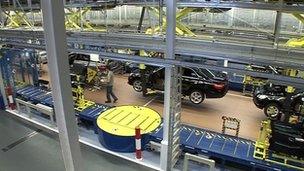German apprenticeships: A model for Europe?
- Published

Apprentice Jascha Fauss could be looking at a job for life at Mercedes-Benz
Jascha Fauss may be doing the kind of thing that nearly two-thirds of young Germans do when they leave full-time education.
Yet he realises that, by European standards, he's lucky. Nineteen-year-old Jascha is almost at the end of a three year, on-the-job apprenticeship at the giant Mercedes-Benz factory just outside Stuttgart in southern Germany.
His trade is mecatronics - a modern combination of mechanical and electronic engineering. It will set him up for what may well be a job for life - if he chooses to stay with Mercedes, which the vast majority of apprentices like him do.
Every year, the Mercedes-Benz parent company Daimler takes on around 2,000 apprentices - that's about a third of the German car industry's yearly intake.
One in five is a woman. Nine out of 10 of the young trainees will land permanent jobs. Others may be offered short-term contracts.
Training plans vary according to the industry, but are always delivered after close consultation between future employers, educators and the government, which picks up part of the bill.
What's notable is that even though the European economy is flatlining outside Germany, the commitment to invest in the skilled labour force of the future is continuing.
Training to be a skilled motor manufacturer can take years, making apprenticeships ideal
'Job opportunities'
When the BBC visits, Jascha is out of the classroom, spending time on the production line with his personal "training meister" - learning the ropes of C, E and S-class car production.
"In my apprenticeship, I'm getting a grounding in every single element of the car, including metal shaping, welding and the most innovative techniques such as hybrid engines and fuel cell propulsion," he says.
"It will equip me to work in different parts of the industry, opening up a lot of job opportunities for the future."
Jascha adds that he has also learnt valuable social skills, as he constantly has to work with different groups of people and his training has included contact with customers.
Wilfried Porth is a main board director of Daimler, the man in charge of human resources and labour relations across the entire group.

Mr Porth says the German apprenticeship model cannot just be copied in other countries
His explanation of how the system works goes to the heart of another conundrum - why Germany's model apprentice schemes have been less successful when transplanted to other countries, with the exception of the Netherlands and Austria.
"I don't think you can just copy and paste apprenticeships," says Mr Porth.
"You need a school system which supports it. We have this tradition in Germany of being loyal to the company. We also have a technology focus here in Germany. For that you need very skilled people.
"It's a system supported by politicians and society - and needed by the companies."
Medieval roots
Young and jobless in numbers
75 million
or 12.6%
of young people are
unemployed worldwide
Three times
more likely to be jobless
7.5 million
are not in education or training
Youth unemployment is highest in
North Africa - 27.9%
and lowest in
East Asia - 9%
Source: ILO 2011
Firms like Daimler - and much smaller ones - play a large part in designing the training, partly through their chambers of commerce, but Germany also has a string of technical universities, whose main role is to equip the country's future labour force.
Hagen Kramer is an economics professor at Karlsruhe University of Applied Sciences, a popular training provider.
He says that such apprenticeship schemes have their roots in the country's medieval guilds. But they play a major part in the continuing success of today's Germany - in spite of the continuing troubles besetting the eurozone.
"The German economy is quite export-oriented - and one of its strengths is high-quality, hi-tech products," says Prof Kramer.

Mercedes, like many other German industrial firms, has an extensive apprenticeship programme
"But you do need a plentiful supply of medium and high-qualified labour to deliver these products. Germany has what's known as a 'dual system'.
"The apprentices must be given structured training by their employer, alongside the general and vocational education they receive. It all ensures Germany has enough labour to do the jobs."
For soon-to-be-qualified apprentice Jascha, a lifetime of work at Mercedes-Benz could be ahead of him - a prospect which he relishes.
But what is abundantly clear is that there's little point in other European countries creating tens of thousands more apprenticeships if there's no commercial demand for the precise skills the young people are to be taught.
For apprenticeships to work for young people, for industry and for taxpayers, the trainees need to be fed into long-term successful businesses, committed to planning future products and investing in the workforce which will be equipped to produce them.
And for countries that have all but lost their industrial base, that's a tall order indeed.